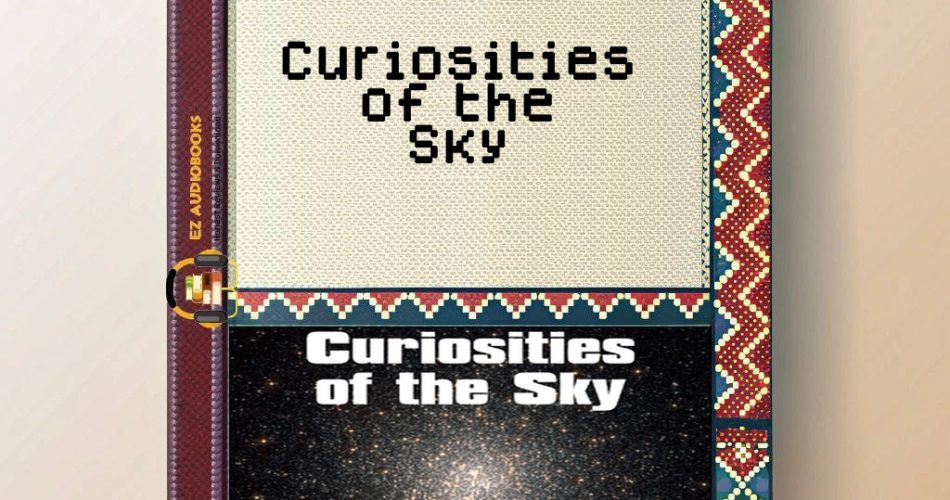Audiobook Sample
Listen to the sample to experience the story.
Please wait while we verify your browser...
- Title: Curiosities of the Sky
- Author: Garrett P. Serviss
- Narrator: LibriVox Volunteers
- Length: 05:43:00
- Version: Abridged
- Release Date: 01/01/2016
- Publisher: LibriVox
- Genre: Science & Technology, Astronomy & Physics
- ISBN13: SABLIB9781631
As a literature professor with a deep fascination for science fiction and the intersection of storytelling with scientific inquiry, I approached ‘Curiosities of the Sky’ by Garrett P. Serviss with a blend of scholarly curiosity and childlike wonder. Published in 1909, this work of popular science seeks to unveil the mysteries of the night sky to a general audience, and I was eager to experience how its prose translates into the audiobook format, especially as a free audiobook available through LibriVox. What fascinates me most is how Serviss, a journalist and science popularizer, crafts a narrative that feels as much like a literary adventure as it does a scientific exploration, inviting listeners to gaze upward with awe.
This audiobook experience stirred a personal memory of a night spent stargazing during my time as a visiting professor in Tokyo. After a long day of lectures, I found myself on a rooftop with a small telescope, much like the curious layperson Serviss writes for, marveling at the same lunar craters and distant stars he describes. That night, under a sky that seemed to bridge cultures and centuries, I felt the same sense of wonder that ‘Curiosities of the Sky’ evokes. Through a cultural lens, I couldn’t help but reflect on how astronomy, as Serviss notes in his preface, is both the oldest and longest-lived science, a universal language that transcends borders and eras, much like the literature I study.
Delving into the content, ‘Curiosities of the Sky’ offers a rich tapestry of astronomical phenomena, focusing on the less obvious marvels of the universe. Serviss explores lunar peculiarities beyond mere craters, speculating on volcanic histories; he details solar activities like sunspots and prominences with vivid imagery; and he captures the transient beauty of comets and meteors. His discussions of planetary oddities – such as the once-theorized canals of Mars – reflect the scientific imagination of the early 20th century, while his musings on deep sky objects like nebulae and the vastness of the Milky Way evoke a poetic reverence for the cosmos. As someone who teaches narrative structure, I admire how Serviss balances factual exposition with an almost lyrical tone, making complex astronomy and physics accessible to all. Though some theories presented are outdated, the historical context of this science and technology audiobook adds a layer of charm, serving as a snapshot of early 20th-century astronomical thought.
Turning to the listening experience, the narration by LibriVox Volunteers presents both strengths and challenges. As a free audiobook, it’s a commendable effort by a community dedicated to preserving public domain works. The volunteers bring a genuine enthusiasm to the text, which aligns well with Serviss’s own fervor for popularizing astronomy. However, the audio quality and performance can be inconsistent due to the collaborative nature of the project. Some chapters are narrated with a clear, engaging tone that enhances the wonder of the content, while others suffer from uneven pacing or less polished delivery. This variability might distract listeners accustomed to professional narrations, but for those who value accessibility over polish, it remains a worthwhile endeavor. I found myself forgiving these inconsistencies, much as I did during my Contemporary Fiction seminar at Berkeley, where we compared audiobook formats of ‘Cloud Atlas’ and noted how raw, authentic readings can sometimes deepen a text’s personal impact.
Analyzing the audiobook through an academic lens, I see ‘Curiosities of the Sky’ as a metaphorical bridge between the empirical and the imaginative, much like the works of Camille Flammarion, whose ‘Popular Astronomy’ similarly blends science with philosophical reflection. Serviss’s focus on specific, intriguing phenomena – rather than a broad overview – sets it apart, offering a narrative intimacy akin to a fireside chat about the stars. This reminds me of when I first encountered cross-cultural narratives; just as language shapes perception in literature, historical context shapes scientific understanding here. While modern listeners might note outdated concepts, the strength lies in Serviss’s ability to inspire inquiry, a pedagogical effectiveness I value deeply as an educator in digital humanities.
Yet, I must offer a balanced perspective. The audiobook’s greatest limitation, beyond narration inconsistencies, is its temporal disconnect. For those seeking current astronomical knowledge, this work serves more as a historical artifact than a practical guide to science and technology. However, its literary style and ability to evoke wonder remain timeless. I recommend this free audiobook to listeners with an interest in the history of astronomy, popular science writing, or those who, like me, find joy in tracing the evolution of human curiosity about the universe. It’s an ideal listen for a quiet evening under the stars, perhaps with a notebook to jot down thoughts on how far we’ve come in understanding the cosmos.
Reflecting on this audiobook experience, I’m struck by how it mirrors my own intellectual journey – bridging the analytical with the emotive, the past with the present. Serviss’s words, even through varied narration, rekindled that rooftop moment in Tokyo, reminding me why stories, whether of distant galaxies or human lives, continue to captivate us. This astronomy and physics audiobook, available as a free download, is not just a lesson in science but a testament to the enduring human need to look up and wonder.
As we part ways on this cosmic journey, dear listeners, I invite you to download this free audiobook and let the night sky speak to you through Serviss’s timeless prose. Until our next literary or celestial adventure, keep your eyes – and ears – open to the wonders around us. Warmest regards, Prof. Emily Chen.

